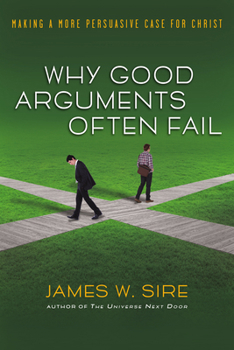Why Good Arguments Often Fail: Making a More Persuasive Case for Christ
Select Format
Select Condition 
Book Overview
You gave it your best shot. You made the best case you knew how, and your friend still wasn't persuaded to follow Christ. Why is it that solid, rational arguments for the Christian faith often fail?For over fifty years James Sire, noted author and public defender of the Christian faith, has asked himself that question. Sometimes, of course, the arguments themselves just aren't that good. How can we make them better? Sometimes the problem has to do with us and not the arguments. Our arrogance, aggressiveness or cleverness gets in the way, or we misread our audience. Sometimes the problem lies with the hearers. Their worldview or moral blindness keeps them from hearing and understanding the truth. With wisdom borne of both formal and informal experience, Sire grapples with these issues and offers practical insight into making a more persuasive case for Christ. Includes an annotated bibliography of resources for framing effective arguments.





